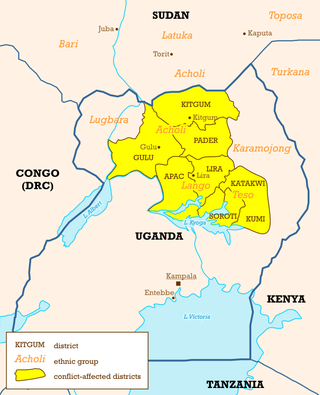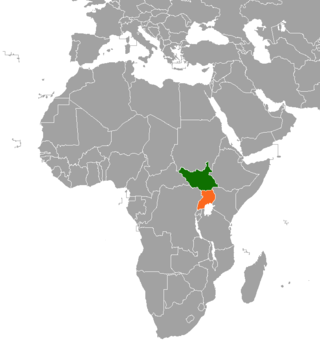Related Research Articles

The Lord's Resistance Army insurgency is an ongoing guerrilla campaign waged by the Lord's Resistance Army (LRA) insurgent group since 1987. Currently, there is low-level LRA activity in the eastern Democratic Republic of the Congo and the Central African Republic. The movement is led by Joseph Kony, who proclaims himself the "spokesperson" of God and a spirit medium. The LRA's current aim is to overthrow Yoweri Museveni's Ugandan government and establish a theocratic state based on a version of the Ten Commandments and Acholi tradition.
Joseph Rao Kony is a Ugandan militant who founded the Lord's Resistance Army (LRA), designated as a terrorist group by the United Nations Peacekeepers, the European Union and various other governments.

Betty Oyella Bigombe, also known as Betty Atuku Bigombe, served as the Senior Director for Fragility, Conflict, and Violence at the World Bank from 2014 to 2017. She was appointed to that position in June 2014. From May 2011 until June 2014, she was the State Minister for Water Resources in the Uganda Cabinet. She was appointed to that position on 27 May 2011. During the same timeframe, she concurrently served as the elected Member of Parliament (MP), representing Amuru District Women's Constituency. She resigned both those positions on 1 June 2014.

Juba is the capital and largest city of South Sudan. The city is situated on the White Nile and also serves as the capital of the Central Equatoria State. It is the world's newest capital city to be elevated as such, and had a population of 525,953 in 2017. It has an area of 52 km2 (20 sq mi), with the metropolitan area covering 336 km2 (130 sq mi).

The start of the period 1994 to 2002 of the Lord's Resistance Army insurgency in northern Uganda saw the conflict intensifying due to Sudanese support to the rebels. There was a peak of bloodshed in the mid-1990s and then a gradual subsiding of the conflict. Violence was renewed beginning with the offensive by the Uganda People's Defence Force in 2002.
The period from 2000 to 2006 of the Lord's Resistance Army insurgency in northern Uganda begins with the assault of the Uganda People's Defence Force (UPDF) upon LRA strongholds in South Sudan. This in turn led to a series of retaliatory attacks by the Lord's Resistance Army of an intensity not seen to since the mid-1990s. International awareness of the conflict gradually grew and in September 2005, the International Criminal Court issues warrants for the arrest of senior LRA commanders, including Joseph Kony.
Vincent Otti (c. 1946 – 2 October 2007) was a Ugandan rebel who served as deputy-leader of the Lord's Resistance Army (LRA), a rebel guerrilla army operating mainly in northern Uganda and southern Sudan. He was one of the five persons for whom the International Criminal Court (ICC) issued its first arrest warrants on 8 July 2005. Rumours of his death began to circulate in October 2007 but were not confirmed until January 2008.

The Juba talks were a series of negotiations between the government of Uganda and the Lord's Resistance Army rebel group over the terms of a ceasefire and possible peace agreement. The talks, held in Juba, the capital of autonomous Southern Sudan, began in July 2006 and were mediated by Riek Machar, the Vice President of Southern Sudan. The talks, which had resulted in a ceasefire by September 2006, were described as the best chance ever for a negotiated settlement to the 20-year-old war. However, LRA leader Joseph Kony refused to sign the peace agreement in April 2008. Two months later, the LRA carried out an attack on a Southern Sudanese town, prompting the Government of Southern Sudan to officially withdraw from their mediation role.

The SPLA-Nasir was a splinter faction of the Sudan People's Liberation Army (SPLA), a rebel group that fought in the Second Sudanese Civil War. Originally created as an attempt by the Nuer tribe to replace SPLA leader John Garang in August 1991, it gradually became coopted by the government. The break away of Riek Machar from SPLM/A resulted in Nuer ethnic group massacring Garang's ethnic Dinka from Bor in the Bor massacre in 1991. This split resulted in the 1994 National Convention of New Sudan in Chukudum.

Magwi County, also Magwe County, is a county in Eastern Equatoria, South Sudan.
Éliane Duthoit, a French citizen, is a senior United Nations official at the Office for the Coordination of Humanitarian Affairs (OCHA).

The Lord's Resistance Army (LRA), also known as the Lord's Resistance Movement, is a rebel group and heterodox Christian group which operates in northern Uganda, South Sudan, the Central African Republic, and the Democratic Republic of the Congo. Originally known as the United Holy Salvation Army and Uganda Christian Army/Movement, its stated goals include establishment of multi-party democracy, ruling Uganda according to the Ten Commandments, and Acholi nationalism.
The 2008–2009 Garamba offensive started on 14 December 2008, when joint Ugandan, DR Congolese and Southern Sudanese forces launched a botched military attack against the Lord's Resistance Army (LRA) in the Garamba region of DR Congo.

Betty Achan Ogwaro is a South Sudanese politician in the government of South Sudan. Betty Achan Ogwaro was the former and the first minister of Agriculture and Forestry in the Republic of South Sudan

Invisible Children, Inc., founded in 2004, is an organization to increase awareness of the activities of the Lord's Resistance Army (LRA) in Central Africa, and its leader, Joseph Kony. Specifically, the group seeks to put an end to the practices of the LRA, which include abductions and abuse of children, and forcing them to serve as soldiers. To this end, Invisible Children urges the United States government to take military action in the central region of Africa. Invisible Children also operates as a charitable organization, soliciting donations and selling merchandise to raise money for its cause. The organization promotes its cause by dispensing films on the internet and presenting in high schools and colleges around the United States.

South Sudan and Uganda are neighboring states with strong cultural economic and political ties. The South Sudan and the neighbouring state of Uganda enjoy relatively strong cultural, political, and economic ties. As South Sudan neared independence, both states begun to take advantage of increased opportunities for trade, development and educational exchanges. The rebel group Lord's Resistance Army (LRA), however, continues to operate in the border areas between South Sudan, the Democratic Republic of Congo and Uganda.
Ikotos County was an administrative area in the Eastern Equatoria state of South Sudan with headquarters in the town of Ikotos. The people, who live in the former county's area by subsistence agriculture and cattle herding, are poverty-stricken. Years of civil war have made violence commonplace: most people have experienced the murder of a close family member. In 2009, AK-47 rifles were used in 42 per cent of killings.

South Sudan, officially the Republic of South Sudan, is a landlocked country in East Africa. It is bordered by Ethiopia, Sudan, the Central African Republic, the Democratic Republic of the Congo, Uganda, and Kenya. Its population was estimated at 10,913,164 in 2022. Juba is the capital and largest city.

The South Sudanese Civil War was a multi-sided civil war in South Sudan between forces of the government and opposition forces. In December 2013, President Kiir accused his former deputy Riek Machar and 10 others of attempting a coup d'état. Machar denied trying to start a coup and fled to lead the SPLM – in opposition (SPLM-IO). Fighting broke out between the Sudan People's Liberation Movement (SPLM) and SPLM-IO, igniting the civil war. Ugandan troops were deployed to fight alongside the South Sudanese government. The United Nations has peacekeepers in the country as part of the United Nations Mission in South Sudan (UNMISS).
The following lists events that happened during 2006 in Sudan.
References
- ↑ "SUDAN-UGANDA: LRA talks, pencils and helicopters", IRIN, 31 May 2007
- ↑ "KPMG to audit Juba peace funds" by Grace Matsiko, The Monitor , 17 May 2007